When it comes to fabric softeners, there are a lot of different options on the market. And while they all promise to make your clothes softer and fluffier, not all are eco-friendly. In this post, we’ll explore some of the best alternatives to fabric softener.
So read on and learn how to make your laundry softer and more environmentally friendly.
Table of Contents
Why Do We Use a Fabric Softener?
Using fabric softener is a very effective way to keep your clothes soft and wrinkle-free. They contain some lubricating ingredients that help coat the fabrics’ soft fibers. They are available as powder, liquid, or dryer sheets. You mix them while laundering your clothes.
How Fabric Softeners Affect the Environment
Most people love the smell of fabric softener, which makes your clothes feel softer. However, you may not know that fabric softeners harm the environment. They contain petroleum-based chemicals that can pollute water and harm aquatic life.
Additionally, most fabric softeners are not biodegradable and can linger in the environment for years.
Best Eco-friendly Fabric Softener Alternatives
The best eco-friendly alternatives are:
Baking Soda
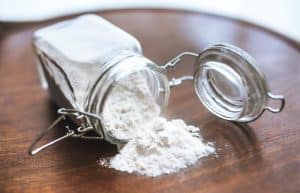
One alternative to conventional fabric softeners is baking soda. Baking soda is a natural cleaning agent that can help to soften fabrics and remove odors. Plus, it’s comparably inexpensive and easy to find.
To use baking soda in your laundry, add a moderate amount to your washing machine, water, and clothes. Then, let the machine do the rest. By making the switch to baking soda, you can help protect the environment and save money at the same time.
Scented Wool Dryer Balls
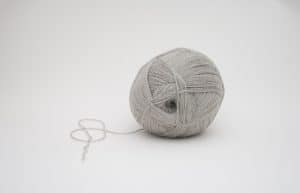
Don’t want to use fabric softener? No problem! Plenty of alternatives can get your clothes just as soft and fresh-smelling. One excellent option is scented wool dryer balls.
Just toss a few of these into your dryer and your laundry; they’ll help soften the fabrics and reduce any lingering odors. Plus, they’ll speed up the drying process, so you’ll return to your cozy cotton sheets quickly.
And if you’re worried about fragrance sensitivities, don’t worry – plenty of unscented options are also available. So why not give them a try?
Note: Avoid scented wool balls if you’re allergic to scents.
Distilled White Vinegar
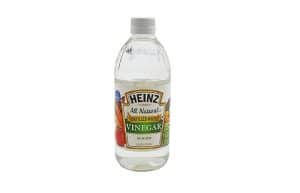
If you’re looking for an eco-friendly fabric softener alternative, look no further than your kitchen cupboard. That’s right; distilled whiter vinegar can soften your clothes while saving you money and helping the environment.
Add two tablespoons of vinegar and enough water to your laundry, and let the washing machine do the rest. You’ll notice a difference in the softness of your clothes, and the vinegar will also help to remove stains.
So, next time you’re in the market for a fabric softener, reach for the vinegar bottle instead.
Hair Conditioners
Have you ever noticed how your hair feels after using conditioner? It’s softer. The conditioner works by coating each strand of hair with a thin layer of lubrication. This lubrication makes it easier for the comb to glide through your hair and helps protect your hair from damage.
In the same way, conditioners can also help to soften fabrics. When you add conditioner to your laundry, it coats each fiber with a thin layer of lubrication. This makes it easier for the material to slide against other fabrics and helps prevent static cling.
In addition, conditioners can add a fresh scent to your clothes.
Crumpled Aluminium Foil
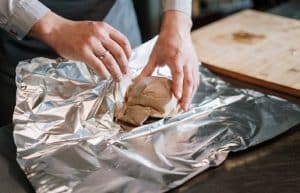
Everyone knows the feeling of clothes coming out of the dryer, feeling stiff and full of static. Luckily, there’s an easy fix for that using something you probably already have in your kitchen: aluminium foil!
Just rip off a sheet of foil, crumple it up, and toss it in the dryer with your wet clothes. The aluminium’s electrical charge will transfer to your clothes and help remove any static cling. Plus, it’s eco-friendly and much cheaper than buying fabric softeners!
So next time your clothes come out of the dryer feeling less than soft, reach for the aluminium foil.
Air Dry
Air dryers use hot air to fluff up the fibers in your clothes, helping to make them softer and more comfortable to wear. They also have the added benefit of being much faster than traditional drying methods, so you can get on with your day without waiting for your clothes to dry.
Plus, since they don’t use any energy, they’re also much better for the environment. So if you’re looking for a way to save money and help the planet, consider investing in an air dryer.
Lavender Water
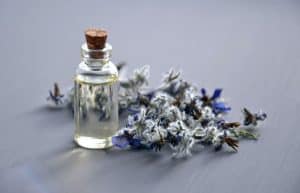
Not only does lavender smell great, but it also has natural antibacterial and antifungal properties. This makes it an ideal choice for fabric softener, as it will help to keep your clothes clean and smell fresh.
In addition, lavender water is inexpensive and easy to make at home. You can combine lavender oil with water in a spray bottle. So, try lavender water next time you’re looking for a natural, eco-friendly fabric softener alternative.
Citrus Oil
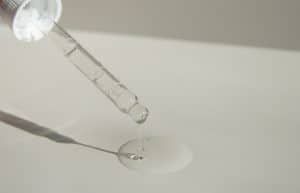
Citrus oils are made from citric acids and can be found as a natural food additive. They are usually extracted from currants or lemons. You can use them in your laundry, but ensure you use the correct quantity for the best results. Citrus oils are non-toxic, biodegradable, and kill bacteria.
Plus, they’ll leave your clothes smelling fresh and looking bright.
Eco-friendly Fabric Softener
If you can’t trust any of the remedies above, you can use eco-friendly fabric softeners. They’re all plant-based and made from cotton seeds.
